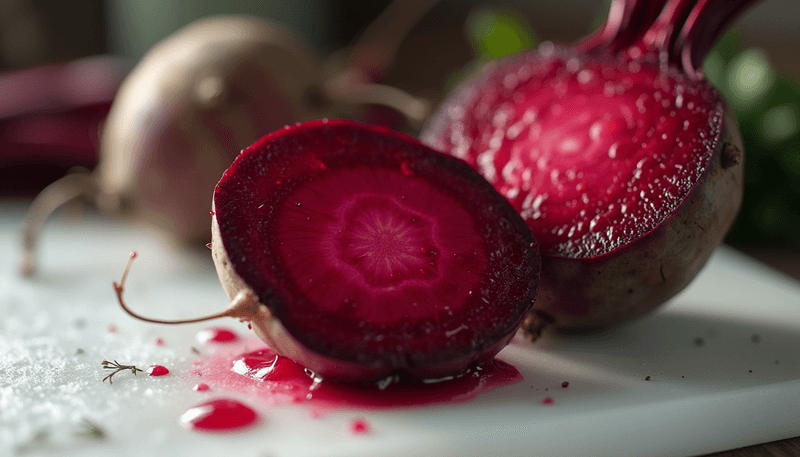Beetroot Power: Your Blood Pressure Friend

That vibrant purple-red juice staining your kitchen counter might just be your heart's new best friend. While beetroot has long been celebrated in traditional medicine, modern science is now backing up these ancient claims with fascinating cardiovascular research. As someone who's navigated both personal health challenges and countless scientific papers, I'm excited to share groundbreaking insights about how this humble root vegetable could be a game-changer for your cardiovascular health.
The Blood Pressure Connection
The most striking finding from this research reveals that beetroot supplements can help lower diastolic blood pressure - that's the bottom number in your blood pressure reading. Unlike previous studies that mainly focused on men, this research specifically looked at women, making it particularly relevant for us.
"Have you ever wondered why some natural remedies work better for certain people than others?"
When we consume beetroot, our body converts its natural nitrates into nitric oxide, a molecule that helps blood vessels relax and dilate. Think of it like a gentle massage for your blood vessels - when they're more relaxed, blood flows more easily, potentially leading to lower blood pressure.
Practical Application:
- Start your day with 1 cup of beetroot juice (about 250ml)
- Best timing: 2-3 hours before physical activity or times of high stress
- Consistency matters more than quantity - small daily amounts can be more beneficial than large occasional doses
Timing Is Everything
One fascinating aspect of this research involves the timing of beetroot consumption. The study showed that the body needs time to process the nutrients effectively.
Key Timing Guidelines:
- Peak benefits occur 2-3 hours after consumption
- Effects can last up to 6 hours
- Morning consumption might offer optimal benefits
Think of it like brewing tea - you wouldn't expect much flavor after just dunking the tea bag for a second. Similarly, your body needs time to convert beetroot's nutrients into active compounds.
The Exercise Connection
While the research didn't show improved exercise performance in this particular study, it revealed something interesting about how our bodies respond to natural supplements differently.
"What if the key to better health isn't about pushing harder, but about supporting our body's natural processes?"
Smart Integration Tips:
- Combine beetroot consumption with regular physical activity
- Focus on consistency rather than quantity
- Listen to your body's response
Making It Work For You
The beautiful thing about beetroot supplementation is its versatility. Here's how to make it part of your daily routine:
-
Morning Ritual:
- Add beetroot to your morning smoothie
- Pair it with citrus fruits to enhance absorption
- Consider beetroot powder if fresh isn't available
-
Meal Integration:
- Roast beets with other root vegetables
- Add raw beets to salads
- Try beetroot hummus as a healthy snack
-
Supplement Strategy:
- Choose supplements with at least 5mmol of nitrate content
- Take them consistently at the same time each day
- Keep a log of how you feel to track benefits
A Note of Caution
While beetroot supplements show promise, they're not magic bullets. The research emphasizes that effects vary among individuals, and factors like age, fitness level, and overall health play crucial roles.
Important Considerations:
- Consult healthcare providers before starting any supplement routine
- Start with small amounts to assess tolerance
- Monitor your blood pressure regularly if using for cardiovascular health
"How might small, consistent changes to your daily routine create significant long-term health benefits?"
The journey to better health often involves simple, natural solutions hiding in plain sight. Beetroot's potential to support cardiovascular health, particularly for women, offers an accessible way to take active steps toward better health.
Your next step? Try incorporating beetroot into your diet three times this week, whether through fresh juice, roasted beets, or a high-quality supplement. Track how you feel and any changes in your blood pressure if you monitor it regularly.
Remember, supporting your cardiovascular health doesn't require dramatic changes - sometimes the most effective solutions are the simplest ones, rooted in nature and backed by science.

Olivia Rose Chen-Martinez
Olivia Rose Chen-Martinez is a seasoned health and wellness writer with a focus on women’s health issues, including PCOS, perimenopause, and holistic wellness. With a background in Journalism and Public Health from UC Berkeley, Olivia draws on over 15 years of writing experience to deliver empathetic, research-backed insights. Her work blends personal anecdotes and actionable advice, resonating with readers seeking accessible and trustworthy information. Based in Austin, Texas, Olivia is also a certified yoga instructor and a dedicated advocate for balanced, integrative approaches to women’s health.






